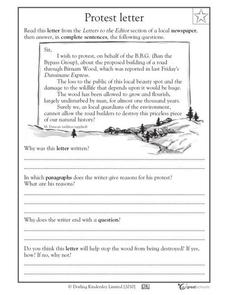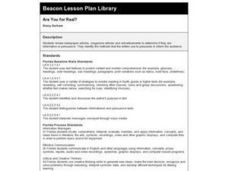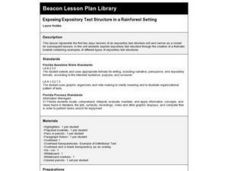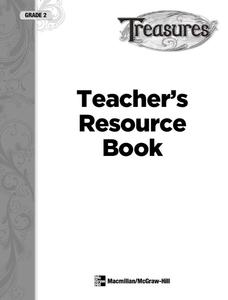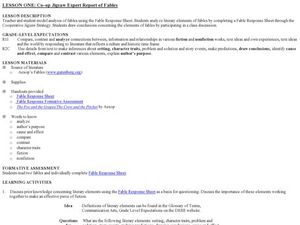Curated OER
Checklist for Persuasive Writing
Provide third and fourth graders with a persuasive writing example and this checklist. Have learners read through the persuasive writing example to find the characteristics included in the checklist. Is the passage a good example?...
Curated OER
Main Idea in Informational Text
Readers identify main ideas and supporting details using informational texts. In this literacy lesson, they make predictions and read the text to find the main ideas. They use a table diagram to define the main idea and supporting...
Curated OER
Doctor DeSoto's Foxy Persuasion
Who is Doctor DeSoto? Start by playing a video clip (included). Discuss different methods of persuasion, and then analyze two different persuasive letter examples. What should your class be looking for? Send them off to work in groups...
Curated OER
Using Details from Text to Identify Author's Purpose
Explore writing techniques by analyzing newspapers and magazines with middle schoolers. They will collaborate in small groups to read local news stories and identify the main ideas and author's intent. They also utilize an information...
Curated OER
Protest Letter
What a fantastic resource to guide youngsters in persuasive letter writing. They read a brief letter to the editor and answer question about the author's purpose, word choice, and structure. Next, scholars draft their own letter by...
Curated OER
Are You For Real?
Students try to find newspaper and magazine articles that are informative or persuasive. They practice determining the differences between the two types of articles. They identify the devices authors use to persuade the audience.
University of Kansas
Newspaper in the Classroom
Newspapers aren't only for reading—they're for learning skills, too! A journalism unit provides three lessons each for primary, intermediate, and secondary grades. Lessons include objectives, materials, vocabulary, and procedure, and...
Curated OER
Exposing Expository Text Structure in a Rainforest Setting
Learners create a thematic booklet containing examples of different types of expository text structures. They explore a variety of expository text structures.
Curated OER
Powers of Persuasion
Did you know that clothing and textiles can be recycled, just like glass, paper, aluminum, and plastic? Pupils are introduced to textile recycling and design persuasive posters or letters that raise awareness about this unique type of...
Curated OER
Deduction
Learners investigate the linguistic devices used by writers to create meaning. In this writing lesson, students discover why writers write in different ways showing examples of different types of text. After reading each type learners...
McGraw Hill
Phonics Teachers Resource Book
Looking to improve your classes literacy program? Then look no further. This comprehensive collection of resources includes worksheets and activities covering everything from r-controlled vowels and consonant digraphs, to the different...
Teachers.net
How to Write a Movie Review from a Pet's Perspective
When would two paws up denote a blockbuster film in your classroom? Only when young writers create movie reviews from a pet's perspective in this imaginative expository writing practice. This engaging topic begins with a class discussion...
Teaching Tolerance
Community Newsletter
What does it take to develop and publish a newsletter? Young academics create a newsletter with original artwork for their school or community. They explore social justice themes and spread messages of tolerance and inclusion. Scholars...
Education World
Take Five: Writing a Color-Coded Paragraph
Use a traffic light to model a very basic paragraph plan. The Go, or topic sentence, is written in green and expresses an opinion about the topic. Information that supports the opinion of the Go sentence is written in yellow and the...
Pennsylvania Department of Education
6 Traits: Word Choice
Pupils explore language arts by participating in a vocabulary usage activity. In this word choice lesson, students read examples of great word usage in literature and discuss with the class why some words appear stronger than others....
Museum of Tolerance
Oral History Activity
Oral history has brought a multitude of lessons, stories, and factoids to our current knowledge of the past. Let us continue to use oral history traditions through a lesson that encourages pupils to discover and appreciate where they...
Museum of Tolerance
Family Role Model Activity
What does is take to be a role model? Through grand conversation, and the use of books and a graphic organizer, scholars find out and apply the requirements to identify a role model within their family. They then journey through the...
Curated OER
What Makes a Cat a Cat?
Students investigate the lives of pets by videotaping them. In this animal life lesson, students videotape a cat and other pets using school cameras in a computer lab. Students review the footage from the cat and other animals and...
Curated OER
Citizens For the New Zoo
Third graders complete Internet research to find information about an animal and its basic needs. They design a model of a zoo habitat that would accommodate their animal. They write a letter of recommendation to a Zoo board of directors...
Curated OER
Cooperative Jigsaw Expert Report of Fables
Young scholars research literary elements of fables. In this literature lesson, students analyze literary elements of fables. Young scholars work collaboratively using a jigsaw strategy to analyze literary elements.






